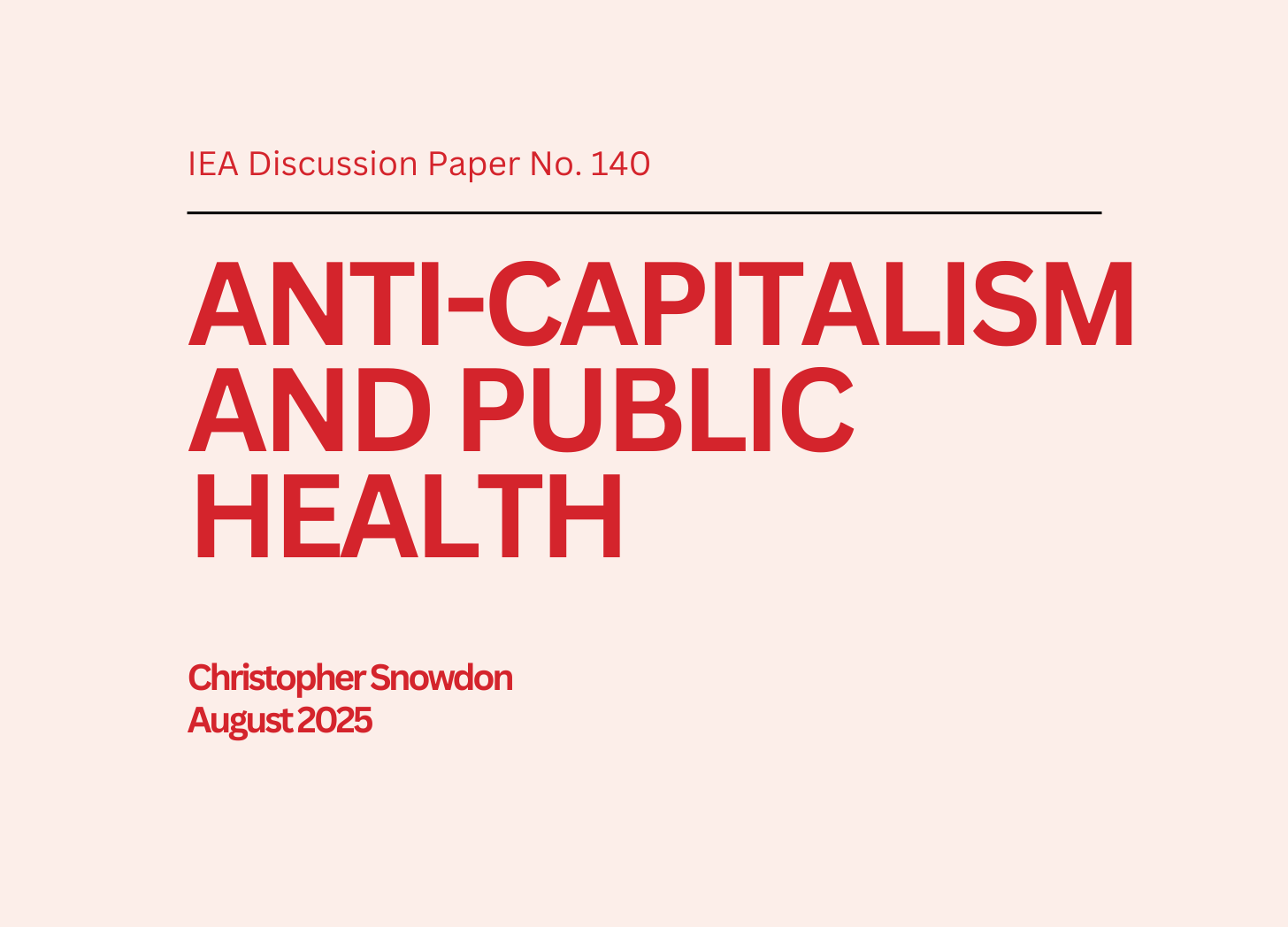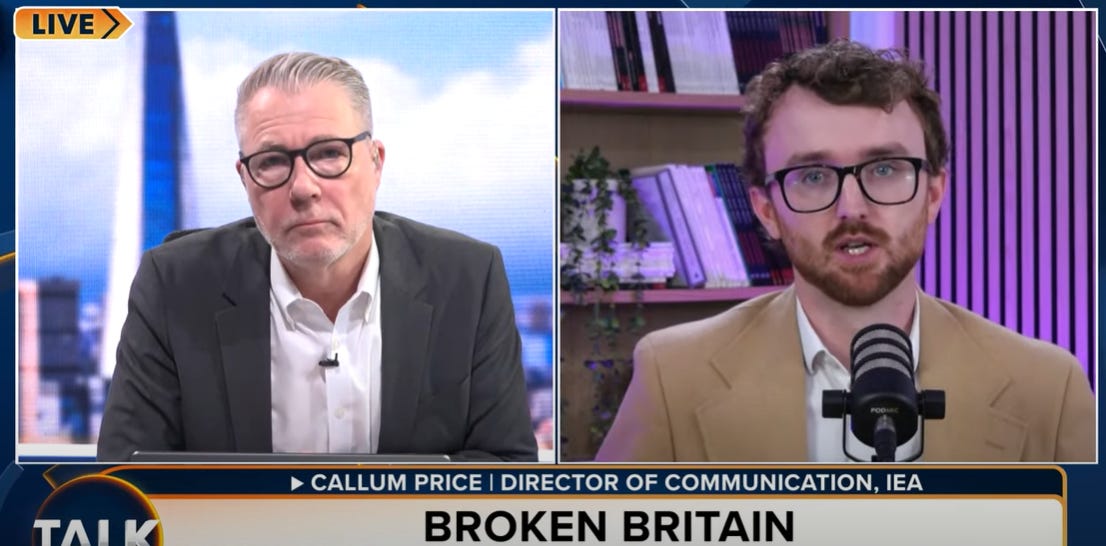Will the Government overhaul property taxes?
Plus: Why unconditional cash transfers fail to improve people's lives
In today’s newsletter:
What tax hikes are being floated by the Government?
Is public health becoming anti-capitalist?
Why are so many people out of work?
One of the talks I give to students on the IEA's summer programmes is about the growth effects of different types of taxes. There's a fairly robust 'ranking' from the OECD and others that runs like this, from least damaging to GDP per capita to most damaging: property taxes, consumption taxes, personal income taxes, corporate income taxes. In principle, for any given amount of revenue, you could make your tax system less economically harmful by leaning more on property and consumption taxes, and less on personal and corporate income taxes.
Of course, it's not quite that simple. A lot will depend on how those property and consumption taxes are structured. As I noted recently, for example, our narrow VAT base undermines that tax's efficiency – causing complexity and economic distortions. Broadening the VAT base while lowering the VAT rate and cutting income tax could be a revenue-neutral, pro-growth move.
As for property taxes, well, Britain raises more from them (as a percentage of GDP) than almost any other developed economy. And yet we do it the most economically damaging way possible. Council tax is irrationally based on property values from 1991. Business rates create a bias against investment in commercial property and infrastructure. Worst of all, stamp duty land tax deters property transactions, gums up an already dysfunctional housing market, and leads to widespread misallocation of real estate (compared to a pure, market outcome) over time. Our whole system of property taxation needs a fundamental overhaul.
It sounds like one might be coming. Treasury figures have been briefing that council tax and stamp duty could be replaced by a new proportional property tax – that is, an annual tax paid by property owners on the value of their home. The newspaper reporting has not been entirely clear on the detail, but it seems likely that civil servants are drawing on a report written by Tim Leunig for Onward last year.
In that version, council tax would be replaced by a local tax of 0.44% on property value up to £500,000. Stamp duty would be replaced by a national tax of 0.54% on property value over £500,000 – with a 0.278% supplement on value in excess of £1m. Crucially, the national tax would not be paid by property owners who had already paid stamp duty on their home. Instead, it would be phased in as properties changed hands – buyers would no longer pay stamp duty on purchase, but would face the new, recurrent tax on value over £500,000 going forward.
There is no doubt that this would represent a big improvement to the structure of property tax in the UK, and help to eliminate the harmful economic distortions that stamp duty creates. I just hope that the Treasury is thinking in those terms, and not looking at this as a way to fill any fiscal black hole. Done properly, this reform would actually lower revenues in the short term, since it abolishes stamp duty immediately but effectively phases in its replacement over time. Trying to turn a proportional property tax into a revenue-raiser would create too many losers and risk hastening the exodus of the high-paid and well-off that we already seem to be experiencing.
I will reserve judgement. But given that the Treasury also seems to have floated introducing capital gains tax on primary residences this week – something that would gum up the property market just like stamp duty, unless it was accompanied by inflation-indexing and comprehensive rollover relief (in which case revenue gains would be small) – I am not convinced that long-term economic considerations are actually front of mind at the moment.
Tom Clougherty
Executive Director
The best way to never miss out on IEA work, get access to exclusive content, and support our research and educational programmes is to become a paid IEA Insider.
IEA Podcast: Head of Media Reem Ibrahim is joined by Executive Director Tom Clougherty and Managing Editor Daniel Freeman to discuss potential new tax hikes and why cash transfers don’t make people happier – IEA YouTube
Anti-Capitalism & Public Health
Public health academics openly advocate overthrowing capitalism while presenting radical views as neutral scientific research, including claims that COVID lockdowns saved 77,000 lives by "switching off capitalism"
Influential WHO advisors smuggle anti-business activism into health policy, targeting "social media, banking, insurance, education, transportation, real estate and utilities" as health threats
Their anti-capitalist agenda demands "fundamental restructuring of the global political and socio-economic system" rather than addressing actual health issues
Modern public health is a fundamentally political movement, and the hardening of its anti-capitalist stance should be taken seriously, a new IEA paper argues
Fighting Back Against Health Authoritarianism, Head of Lifestyle Economics Dr Chris Snowdon is interviewed by Head of Media Reem Ibrahim, IEA YouTube
Public health and the eternal paternalist, Head of Lifestyle Economics Dr Chris Snowdon writes for The Critic
Capitalism isn’t going to be overthrown by a few academics writing papers about the “commercial determinants of health”, even with the support of the WHO, but the public health lobby has more influence on government policy than the kind of sociologists who usually come out with this claptrap. You only have to go back to the pandemic to see how much power they can wield.
News and Views
25 Percent of Working Age Brits Are Out of Work. Why Is the U.K. Government Paying Millions To Stay Home?, Head of Media Reem Ibrahim writes for Reason
There is nothing compassionate about a system that wastes millions of lives. Britain's sickness is a warning to the world. When the state pays people to give up on themselves, many will. For people to flourish, they must not be told they are too broken to work; they should be told they are capable of so much more.
UK Economy in “Doop Loop”, Director of Communications Callum Price interviews Sir Simon Clarke for the IEA YouTube channel
A Bermuda triangle for Conduit stock, Economics Fellow Julian Jessop quoted in The Times
Soaring air fares may have skewed July’s inflation figures, now at 3.8 per cent. But, as the Institute of Economic Affairs noted: “There were also large upward contributions from hospitality and from food — two sectors which have been hit particularly hard by rising labour costs in the wake of last October’s budget”. Still, at least the chancellor’s efforts had no effect on “working people”.
Trump's Trade Policies Just Make America Poorer, Head of Media Reem Ibrahim interviews American Enterprise Institute Senior Fellow in Economic Policy Stan Veuger for the IEA YouTube channel
It seems ever more popular to try and pin the blame for any problem on capitalism, Director of Communications Callum Price writes for ConservativeHome
Capitalism needs a radical, and explicit defense in political and public life, including from our politicians. That is not to say there are not obvious problems that need fixing, from home ownership to the welfare trap. But rather to say that the system that has been so successful so far does not need to be ripped up in order to solve problems in public health, the environment, or the Middle East. The evidence shows that free markets are the solution, not the problem.
'We have to be able to say abhorrent things, otherwise this is not a free country’, Head of Media Reem Ibrahim discussed Lucy Connolly’s release on GB News
The biggest tax heist (that you may not have even noticed), Economics Fellow Julian Jessop quoted in The Times
Before the general election last year, Labour promised not to increase taxes for “working people”. However, the economist Julian Jessop, formerly of the Institute of Economic Affairs, a free market think tank, said: “It is almost certain that Rachel Reeves will extend the freeze on personal tax thresholds in the autumn budget, which would hurt working people by taking more money out of their payslips and be a clear breach of the promises made in Labour’s manifesto.
Broken Britain?, Director of Communications Callum Price appeared on TalkTV
‘Every young person with an ounce of ambition has left the country to go to Dubai…’, Head of Media Reem Ibrahim discusses the state pension on LBC







Another great assessment Tom. You may be aware, I have tried previously to promote my proposal on this platform through the IEA. I’m happy to see you take on board a scrapping of taxes on the one hand but replacing them with something else that again could be another but, different propping up of a broken model is not my way. Any taxation in its basic form should be enough to collect the tax amount required and be a simple and easy product of a fair and equitable trigger. Ad hoc versions of tax are in itself not simple nor fair or equitable. The reason why we think we need more taxes is predominantly because the basic fair ones are insufficient. But that theory doesn’t take account of the triggers for taxes. In our present system the triggers are SPENDING and MONEY having to change hands, like Council tax. Many people confuse this with receipt of income and assume income paid is the trigger that pays tax. But they are mistaken. Despite ‘Income’ being in the heading, taxes are not paid by the employee. It’s paid by employers from their profits from customers SPENDING with the employer who in turn SPENDS on the wages of employees. So the triggers are SPENDING. It’s money changing hands via SPENDING that triggers taxes. It’s based on wages but paid by business and employers SPENDING r earnings and income. We all pay VAT and duty on fuel, alcohol and tobacco again all taxes are triggered by SPENDING money. But the tax triggering off a pot of money by SPENDING is only as good as the amount in the pot! A small pot of money gets little SPENDING hence little tax take. So these other vehicles of taxes are a result of that pot being devoid of money and subsequent spending. So they try and gain more tax take by the shortfall. My view is not have many taxes Tom. Just one, vat. Via SPENDING of all MONEY having to be in the one pot. That will create such a high level of tax take the government will not need to borrow ever again. As they just adjust up or down the vat rate. The need for more taxes comes from their inability to control our money. Money is our sovereign matter. We should control every penny. We now have electronic banking so use it. Don’t allow money to go abroad. All £s stay in the uk. Under the same rules. Earn as much money as you can but you have to spend it back. Ensuring rotation and redistribution across our economy. Never should we be devoid of it. Reinstate the exchange controls we had before Thatcher. Take control of OUR money. Allow goods to flow but not money. That stays. Put a spend by date on all or at least most of income. Be rich off goods and services. Not money itself. Create a framework that ensures one fair tax for all pays our way. Vat will do that. Anything else is unnecessary and unwanted. Spending money is the key to a working economy. MS=R is the equation. With a time limit of a month ideal. Money multiplied by SPENDING equals Revenue. That revenue creates tax revenue within it. The more money the more spending the more revenue. Less money means less spending means less revenue and less tax take. Simples! It doesn’t need overcomplicating. It’s autonomous and perpetual. Start from that point of view and you get a framework for money flow and incentives to work we need.